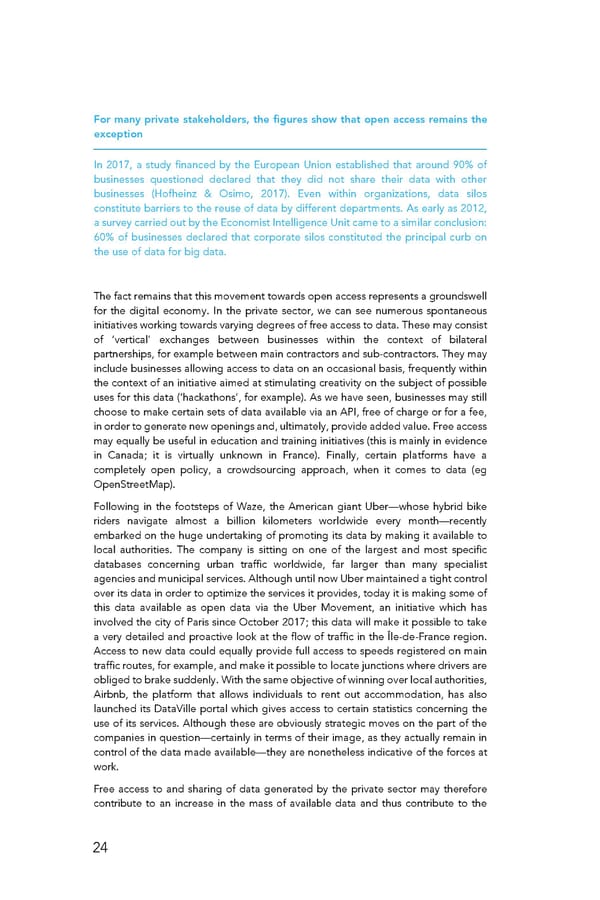For many private stakeholders, the figures show that open access remains the exception In 2017, a study financed by the European Union established that around 90% of businesses questioned declared that they did not share their data with other businesses (Hofheinz & Osimo, 2017). Even within organizations, data silos constitute barriers to the reuse of data by different departments. As early as 2012, a survey carried out by the Economist Intelligence Unit came to a similar conclusion: 60% of businesses declared that corporate silos constituted the principal curb on the use of data for big data. The fact remains that this movement towards open access represents a groundswell for the digital economy. In the private sector, we can see numerous spontaneous initiatives working towards varying degrees of free access to data. These may consist of ‘vertical’ exchanges between businesses within the context of bilateral partnerships, for example between main contractors and sub-contractors. They may include businesses allowing access to data on an occasional basis, frequently within the context of an initiative aimed at stimulating creativity on the subject of possible uses for this data (‘hackathons’, for example). As we have seen, businesses may still choose to make certain sets of data available via an API, free of charge or for a fee, in order to generate new openings and, ultimately, provide added value. Free access may equally be useful in education and training initiatives (this is mainly in evidence in Canada; it is virtually unknown in France). Finally, certain platforms have a completely open policy, a crowdsourcing approach, when it comes to data (eg OpenStreetMap). Following in the footsteps of Waze, the American giant Uber—whose hybrid bike riders navigate almost a billion kilometers worldwide every month—recently embarked on the huge undertaking of promoting its data by making it available to local authorities. The company is sitting on one of the largest and most specific databases concerning urban traffic worldwide, far larger than many specialist agencies and municipal services. Although until now Uber maintained a tight control over its data in order to optimize the services it provides, today it is making some of this data available as open data via the Uber Movement, an initiative which has involved the city of Paris since October 2017; this data will make it possible to take a very detailed and proactive look at the flow of traffic in the Île-de-France region. Access to new data could equally provide full access to speeds registered on main traffic routes, for example, and make it possible to locate junctions where drivers are obliged to brake suddenly. With the same objective of winning over local authorities, Airbnb, the platform that allows individuals to rent out accommodation, has also launched its DataVille portal which gives access to certain statistics concerning the use of its services. Although these are obviously strategic moves on the part of the companies in question—certainly in terms of their image, as they actually remain in control of the data made available—they are nonetheless indicative of the forces at work. Free access to and sharing of data generated by the private sector may therefore contribute to an increase in the mass of available data and thus contribute to the 24
 For a Meaningful AI - Report Page 24 Page 26
For a Meaningful AI - Report Page 24 Page 26